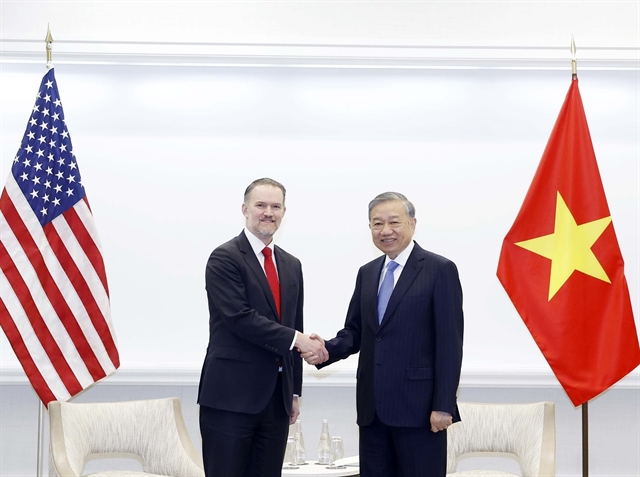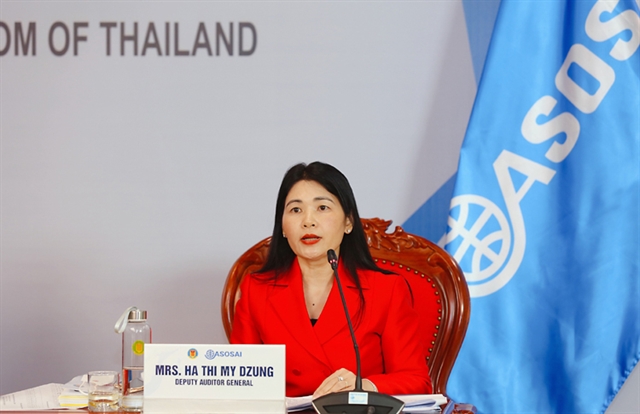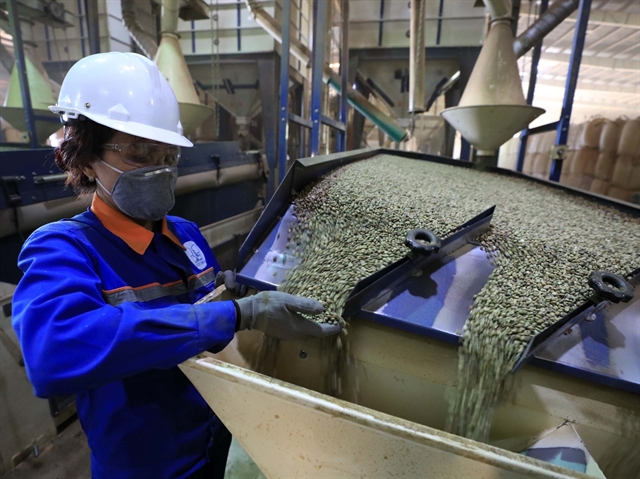 Politics & Law
Politics & Law


|
| Deputy Auditor General Hà Thị Mỹ Dung delivers the report at the ASOSAI Assembly. — Photo sav.gov.vn |
HÀ NỘI — Three years after the implementation of the Hanoi Declaration by the Asian Organisation of Supreme Audit Institutions (ASOSAI), a report on its effectiveness has shown success in both the sustainable development of goals and tackling global environmental challenges.
The report on the Hanoi Declaration was presented by Deputy Auditor General of the State Audit Office of Việt Nam (SAV), Hà Thị Mỹ Dung, at the plenary session of the 15th ASOSAI Assembly, held on September 7.
The report was approved by Supreme Audit Institutions (SAI).
The Hanoi Declaration was endorsed by the 14th ASOSAI Assembly, hosted by Việt Nam in 2018, with the theme “Environmental Audit for Sustainable Growth".
Dung said the declaration has become an important part of ASOSAI's strategic vision for development, with the aim of realising the sustainable development goals of the United Nations.
Other achievements include the promotion of professional knowledge sharing within the ASOSAI community, particularly in the field of environmental auditing for sustainable development.
Through the ASOSAI's "Working Group on Environmental Auditing", the ASOSAI has played an active role in the international auditing community, applying science and information technology in environmental auditing activities.
The SAI has continued to train its staff in professional auditing knowledge.
Readiness to address current issues
Another important milestone of the ASOSAI during the 2018-2021 term was the establishment of a Task Force to implement sustainable development goals. The 15th ASOSAI Assembly approved this task force to prove the willingness of ASOSAI to address urgent global issues.
During 2020-22, ASOSAI cooperated with the Knowledge Sharing Committee of INTOSAI (International Organisation of Supreme Audit Institutions) on a cooperative audit programme relating to public healthcare systems, in the context of the global crisis caused by COVID-19.
According to Dung, SAI have conducted 84 environmental audits, covering a wide range of environmental issues, and 35 audits relating to sustainable development goals between 2018 and 2021.
Ready for change and challenges
Assessing the effects of the Hanoi Declaration, Dung said the achievements of the ASOSAI Working Group have proven that ASOSAI is a strong model for the region.
The adherence to the recommendations of the Hanoi Declaration of ASOSAI has shown just how serious the region is about common challenges, particularly in environmental auditing and sustainable development, which is a top priority of many nations.
Environmental and sustainable development auditing has proved a structured approach to help shape responses.
Firstly, it has enabled governments to enact stronger measures to protect the environment, as well as raising awareness in dealing with related issues.
Secondly, it has enabled the establishment of long-term mechanisms and allows for changes to the current legal, and future policy, framework.
Thirdly, it has assessed the suitability of government programmes and plans from a sustainable development aspect.
Fourthly, it has adjusted the approach from argumentative auditing to focusing on auditing capabilities for policymaking, to help implement policy goals.
Fifthly, these audit programmes allow for greater operational efficiency through knowledge sharing, helping to cope with future challenges.
On the basis of recent achievements, the ASOSAI has set new goals for the future, including promoting knowledge sharing, actively participating in international forums, the application of various auditing methods and techniques, and promoting training for auditing staff. — VNS


.jpg)

